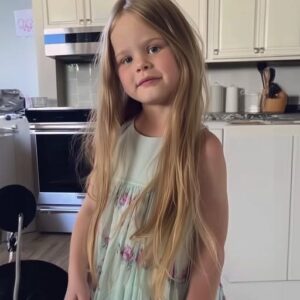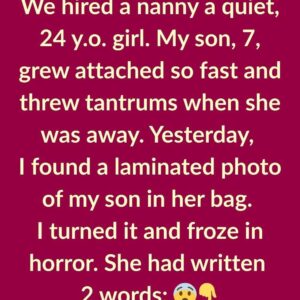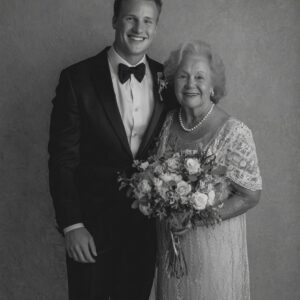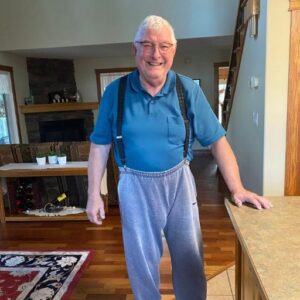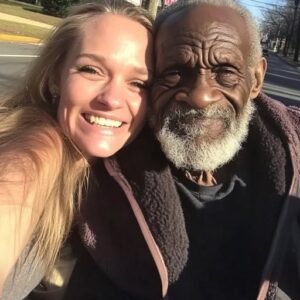
That’s him.
That smile. The little watch we gave him for his fifth birthday. The shirt with the goofy cartoon sharks he refused to take off for a week. He disappeared wearing that exact outfit.
Three months. Gone. No ransom note, no sightings, no trail. Just an unlocked back gate and a hole in my sister’s chest that nothing could fill. We searched every corner of town. Put up posters. Sat with detectives who stopped pretending they had leads.
People stopped bringing it up after a while. Like silence would hurt less than hope.
Then one morning, I was sitting in a laundromat, flipping through the free community newspaper someone left behind. It was a fluff piece—“New Faces at the County Fair”—a full-page spread of smiling kids and their adopted parents.
I almost missed it.
But there he was, in the second row, between a tall blond woman and a man in a green polo. His name read “Eliot Branson – 5, loves dinosaurs and cotton candy.” But that wasn’t Eliot. That was Max. Max with his wide eyes and the tiny scar above his right eyebrow from when he tripped in the driveway.
My heart dropped like it had forgotten how to beat.
I stared at the page for a long time. Maybe I was wrong. Maybe it was just a kid who looked like him. But I knew. In my gut. In the part of me that stayed up every night praying to hear his voice again. That was Max.
I took the paper home and showed my sister, Lena. She froze. Didn’t speak. Just dropped her coffee and gripped the edge of the counter.
“Where did you find this?” she asked, her voice paper thin.
“Laundromat on 8th. This week’s edition.”
She nodded slowly, then broke. Right there, on the kitchen floor, knees to tile, shoulders shaking. I held her for ten minutes. It had been so long since I’d seen her cry. She’d gone numb. But this—this was a crack in the concrete wall she’d built around herself.
We took the paper to the police.
They were skeptical. Told us it could be a lookalike. That these adoption events often brought kids from out of state. But Lena insisted. She pulled out baby pictures, the scar, the watch. All of it.
After enough pestering, they finally agreed to look into it. Quietly, they said. They didn’t want to spook the adoptive family if it wasn’t him. I understood. Barely.
A week passed. Then two. Nothing.
Lena started driving past the address they’d tracked down for the Bransons. A neat blue house with white trim and wind chimes on the porch. Max—Eliot—was usually outside playing in the yard with a big yellow lab. He looked happy. That hurt more than anything.
“He doesn’t look scared,” Lena whispered one evening as we sat in her car. “What if he doesn’t even remember us?”
“He’s five,” I said, trying to sound confident. “He remembers.”
But I wasn’t so sure.
The third week, the police called. It was Max.
DNA matched from a water bottle pulled from their trash. They didn’t arrest the couple right away. Wanted to understand how they’d gotten him. Said there was no sign of abuse. That they seemed genuinely caring.
Lena was furious. “Caring? They stole my son!”
Turns out, they hadn’t “stolen” him themselves. A woman in their adoption network had offered them a child “whose mother was in a tough spot and wanted to give him up quietly.” She showed them papers. A story about an abusive father. Said the boy had no extended family. Everything was forged.
They paid her ten grand.
Her name was Felicity Marsh. A private adoption broker—unlicensed, underground. She vanished before police could get to her.
So now we had a weird situation: the Bransons had a child that wasn’t legally theirs, but also weren’t directly responsible for his disappearance. And Max—well, he only knew them as Mom and Dad for the last three months.
Lena had to fight for him in court.
It took another month. Court hearings. Psychologists. Social workers. Questions. So many questions. “How has he adjusted? Does he recognize his birth mother? What’s in his best interest?”
The Bransons didn’t want to give him up.
That shocked me. I thought they’d be horrified to learn he had a real family, a mother who never stopped looking. But no, they hired a lawyer. Said they’d grown attached. That he was stable and well-cared-for with them.
It turned ugly.
And through it all, Max stayed in foster care—neutral ground, they called it. He was confused, quiet. The sparkle in his eyes dimmed. Lena saw him once a week in supervised visits. He barely spoke.
She cried every night.
One evening, after a particularly cold court session, Lena looked at me and said, “What if I don’t get him back? What if I never hear him say ‘Mama’ again?”
I didn’t know how to answer.
Then came the twist no one expected.
A social worker named Darren, quiet and observant, had been following the case closely. He requested a private meeting with the judge, presenting something unusual: a letter.
From Max.
Well, from Eliot, technically.
With the help of a counselor, Max had written a short note. Crayon letters. Spelling errors. But one sentence stood out: “I miss the lady with the dog voice who sings the shark song.”
That was Lena. She used to sing “Baby Shark” in the weirdest growly voice, just to make Max laugh. He loved it. It annoyed everyone else. He called it her “dog voice.”
The judge took a long pause after reading it aloud.
The Bransons looked pale. Their lawyer said it could be coincidence. But the judge had heard enough.
Two days later, custody was officially returned to Lena.
Max came home.
It wasn’t perfect. At first, he was quiet. Didn’t like his old room. Asked for “the big yellow dog” every morning. Lena had to earn him back, piece by piece.
She played with him on the floor for hours. Made peanut butter sandwiches the way he liked them—cut into triangles. She sang the shark song in her ridiculous dog voice until he smiled again.
One night, he called her “Mama” in a whisper.
She wept in the hallway for ten minutes.
I stayed close through it all. Helped where I could. Max and I started a little weekend routine: Saturday morning pancakes and a walk in the park. I never thought I’d be that emotional over syrupy fingers holding mine.
A few weeks later, the Bransons sent a letter.
No threats. No legal talk. Just… an apology. A real one.
They admitted they were naïve. That they let their desperation to become parents blind them. They said Max was a gift, even if they weren’t meant to keep him. And enclosed was a small box.
Inside: the cartoon shark shirt, carefully washed and folded.
Lena cried again. This time, it felt like closure.
Max is different now. A little more cautious. But he’s also resilient, smart, and slowly healing. He asks more questions. Talks about the “blue house people” sometimes. But he doesn’t seem afraid anymore.
And Lena? She’s stronger than ever.
She’s joined a network for missing children’s families. Helps others find their way through the dark. She even convinced our town to install better child safety systems in local parks.
And me? I’m just grateful.
Grateful for a crumpled newspaper in a laundromat.
Grateful for a five-year-old with a memory sharp enough to recall his mom’s silly voice.
And grateful that sometimes, just sometimes, life gives you back the thing it stole.
We live in a world where not every missing child comes home. But this time—this one rare, miraculous time—we got a second chance. Not because of luck. But because of relentless love, stubborn hope, and a little boy who remembered the sound of his mother’s silly shark song.
So here’s the truth: if you ever feel like you’re yelling into the void, like no one hears you, keep yelling.
Love is louder than silence.
And sometimes, the smallest voice—the crayon-scrawled memory of a child—can tip the scales.
If this story touched you, share it. Like it. Let someone else believe in miracles again. Because they happen. Not often. But just enough to keep the world spinning.
